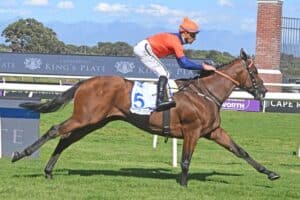Nigel once lost his pants while competing in a jumps race - and made no attempt to cover himself up.

This coming Sunday, 26 November, Bloodstock South Africa host their Two Year Old Sale at the TBA Complex in Gosforth Park, Germiston.
As you’d expect, many of the big brand breeders will be consigning thoroughbreds but so to will some of the smaller unsung independent stud farms.
One such farm is Heversham Park and the man behind it is one of racing’s true mavericks: Advocate Nigel Riley.
Riley was born in the UK and has been riding ponies since he was a toddler. At the age of six his father, a professional rugby league player, emigrated to South Africa where the family settled on the East Rand. Riley remembers the family running a few hotels and continuing to own a few horses which meant that he was never too far from racehorses.
In the early 1980s Riley returned to the UK to do his A levels. He did so at Heversham Grammar School.
Heversham, after which Nigel would later name his farm, is a village in the Westmoreland and Furness region of Cumbria and lies picturesque above the marshes of the River Kent estuary as it flows into Morecambe Bay.
Its rich history includes an early Anglo-Saxon abbey that was destroyed by Norse Vikings around 900 AD.
I am presently watching the History Channel series Vikings so I am pretty sure historians will blame the descendants of Ragnar Lothbrok for the dreaded deed.
ALSO READ: Praise be for rich people handing out cash
The grammar school itself was founded way back in 1619 by Edward Wilson and although originally built on Heversham Head above the local church it was moved into the village in 1870. More recently, not long after Nigel departed back to sunny South Africa, the school was amalgamated with the comprehensive school in Milnthorpe and in 1984 became the boarding house and 6th Form College of Dallam School.
On his return home Nigel made swift progress towards becoming a licensed racehorse trainer.
He served his two year apprenticeship under the highly regarded and much loved Stanley Ferreira. Ferreira, who sadly passed in 2019, gave him such good grounding that at the relatively tender age of 23 Nigel took out a licence and began training in the Vaal before later moving to the Randjesfontein Training Centre.
At Randjes his neighbour was Durban July winning trainer Patrick Shaw, whose principal owner Fred Crabbia owned a dairy farm in the Daleside Valley, south of Johannesburg. Crabbia, who would later own Singapore Horse of the Year, Rocket Man, had already converted some buildings into stables so when Riley invited Ormond Ferraris to a site-visit the legendary horseman was quick to give him the seal of approval.
Riley put in training tracks and more stables and began to train from the farm. Described on their website as tranquil and ‘overlooked by the majestic Paardekop’ that property is today known as Heversham Park Stud.
ALSO READ: Relationships between trainer, jockey and owner runs to heart of horseracing
I could regale some stories of Nigel’s bush racing days near Hartbeespoort or his experience of riding in hurdle races at Epsom and Longchamp. However, as intriguing as ‘From Harties to Paris’ might sound, that headline and content will forever take a back-seat to Francois Wolfaardt’s drama-laden article entitled “Hurdling – the bottom line”.
In one of his iconic ‘Inside Track’ pieces Wolfaardt, a wonderful raconteur, scribe and race-caller, wrote of the jump race at Gosforth Park in which Nigel literally lost his pants!
“I kid you not,” wrote Wolfaardt, “approaching the last fence, there was Riley with his rods (breeches) around his ankles and going his hardest to catch Ms Foxcroft”.
To this day Nigel remembers it well and confirms Francois’ accurate reporting. Of course he made no attempt to cover himself up, there was a race to be won and heaven forbid he got beaten by a short head.
Nigel quit training in 2002, taking Alec Costa’s advice that he was wasting his time training racehorses and he should rather concentrate his considerable faculties on the law profession.
While that has proven sage advice his Heversham Park Stud project continues to grow. Committed to supporting locally bred and performed stallions, Heversham now stand four stallions: Cape Town Noir, Jackson, Moofeed and recently arrived Pomodoro. They currently have 36 mares on the farm.
ALSO READ: Proteas learn what every horse punter knows: there’s no such thing as a certainty
Riley is adamant that South Africa’s horseracing and breeding industry should do more to drive empowerment. In this regard Heversham have walked the walk.
In employing Japhta Kghaphola as farm manager, they were the first stud farm to hire a black candidate in said position and they currently sponsor two aspiring black apprentices in Siyanda Sosibo and Siphesihle Hlengwa. Riley added that he would like to see better support for trainers of colour who historically have struggled for support.
Heversham Park Farm are offering a well-balanced, seven strong draft at Sunday’s sale and are hosting a hospitality lounge next to the entrance of the sales ring. All interested parties are welcome and for his part Nigel has promised to keep his trousers on at all times.






